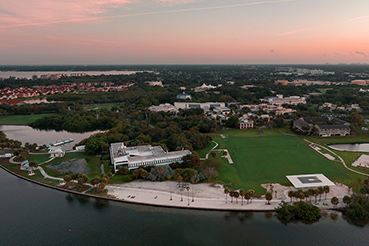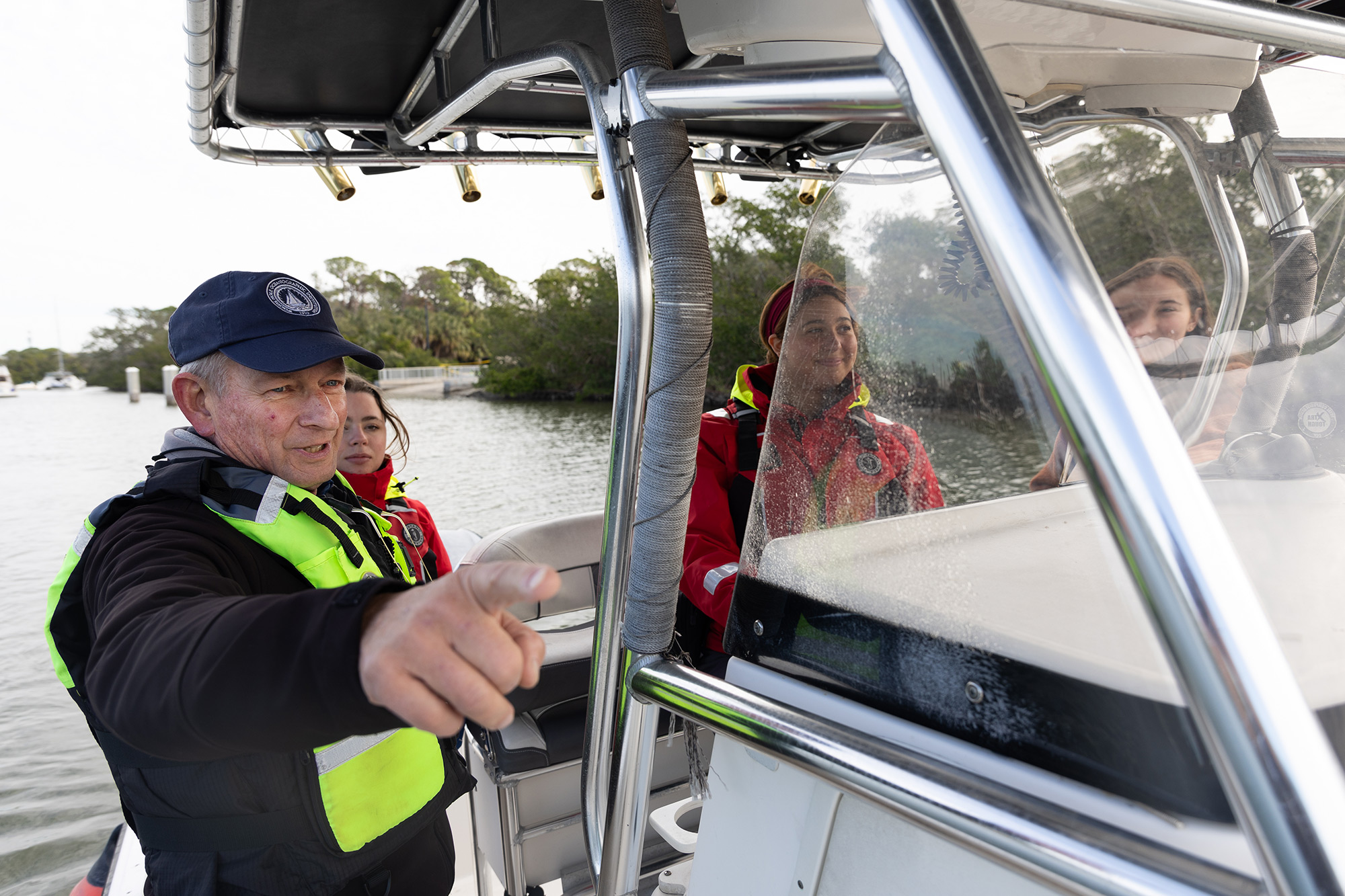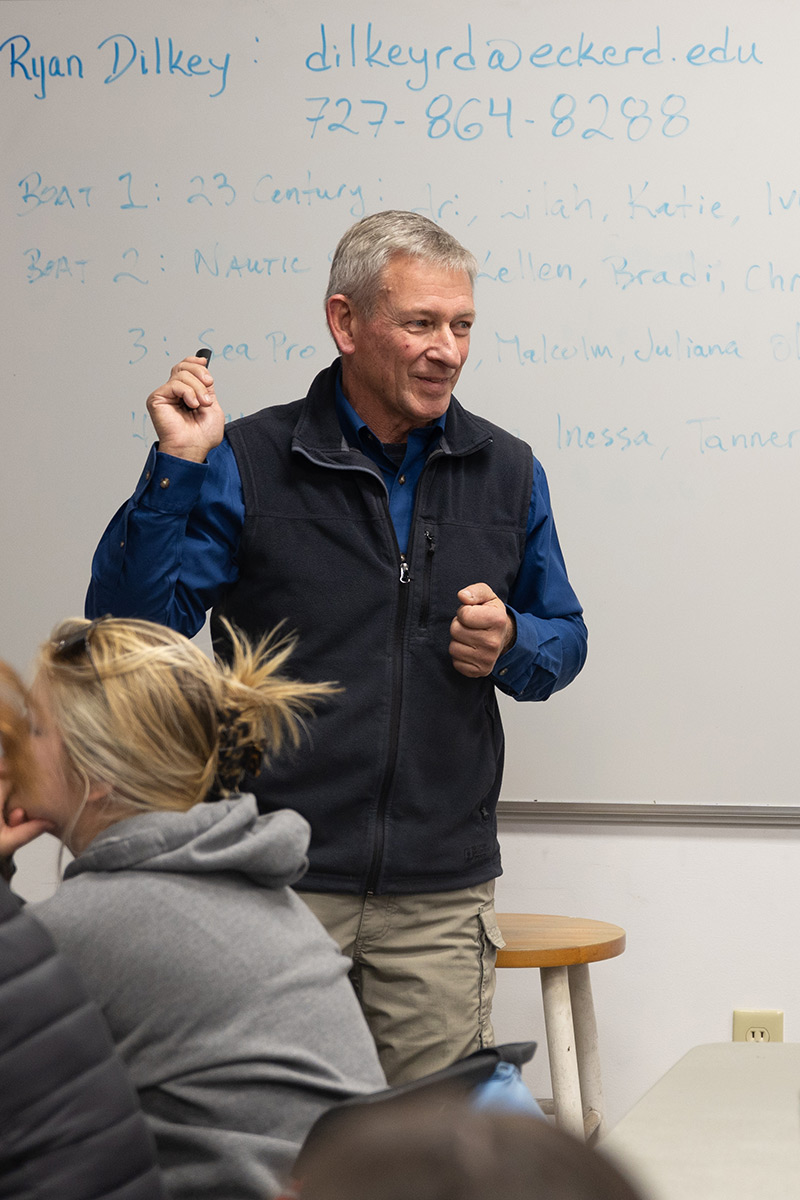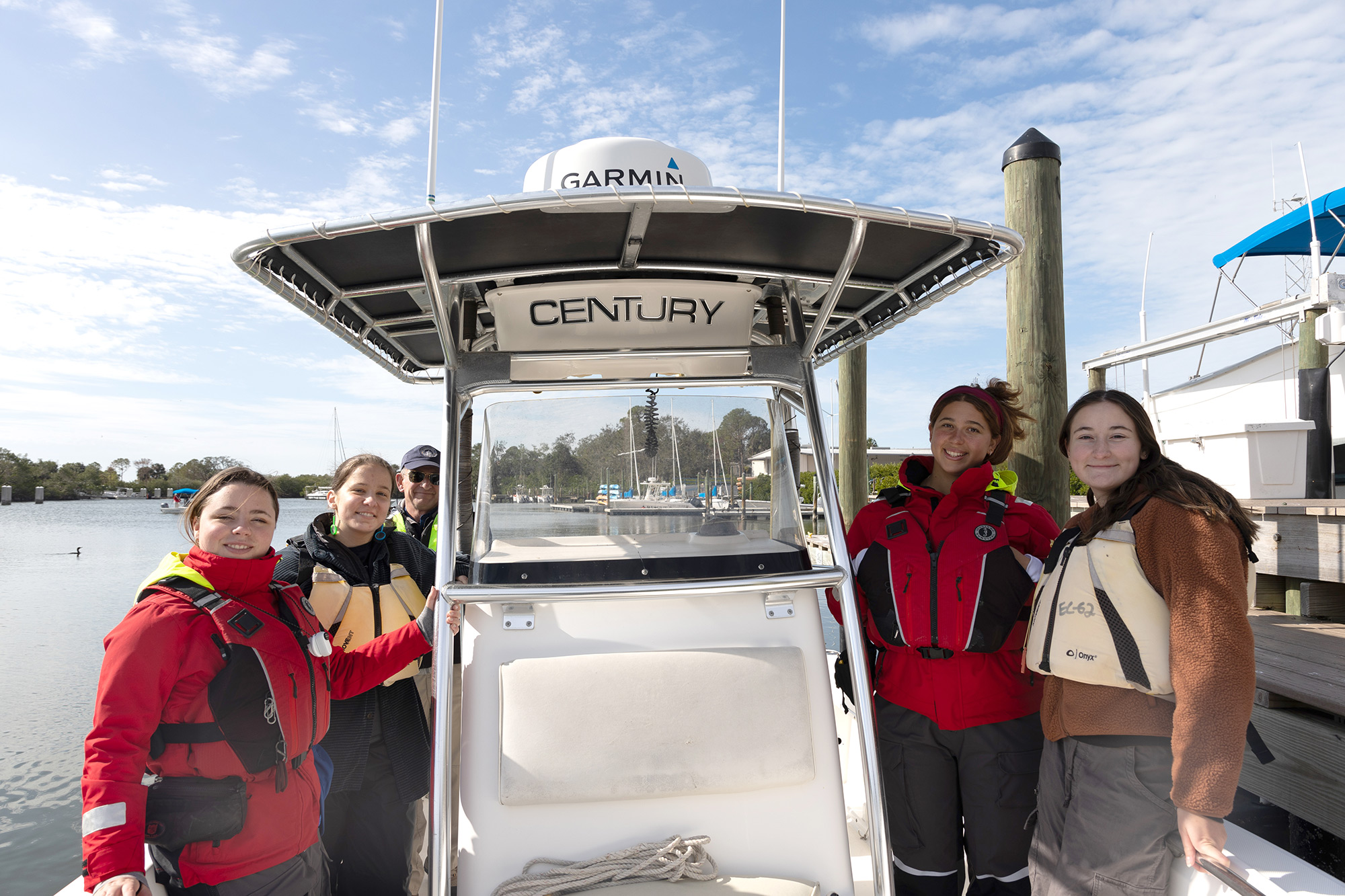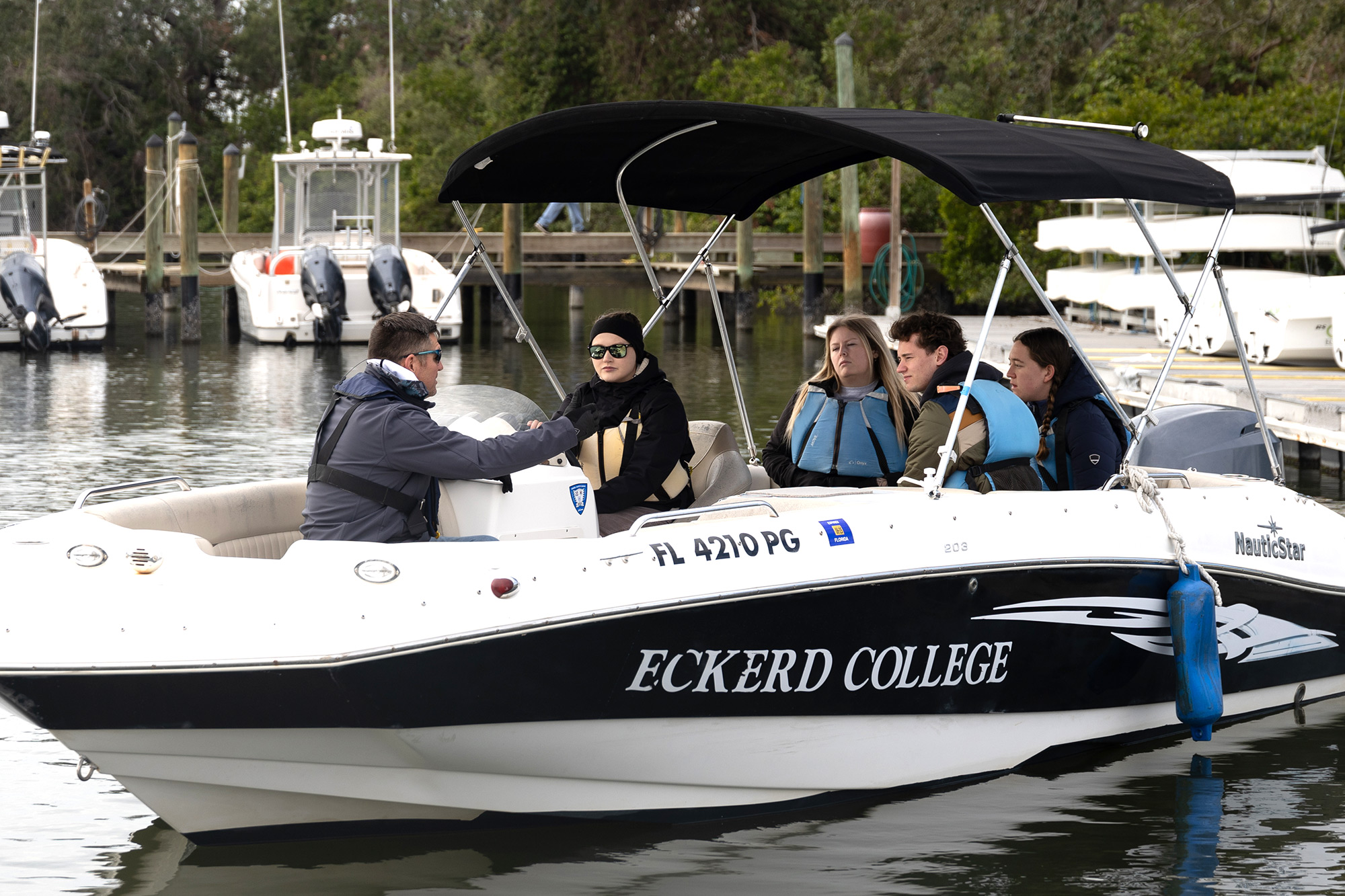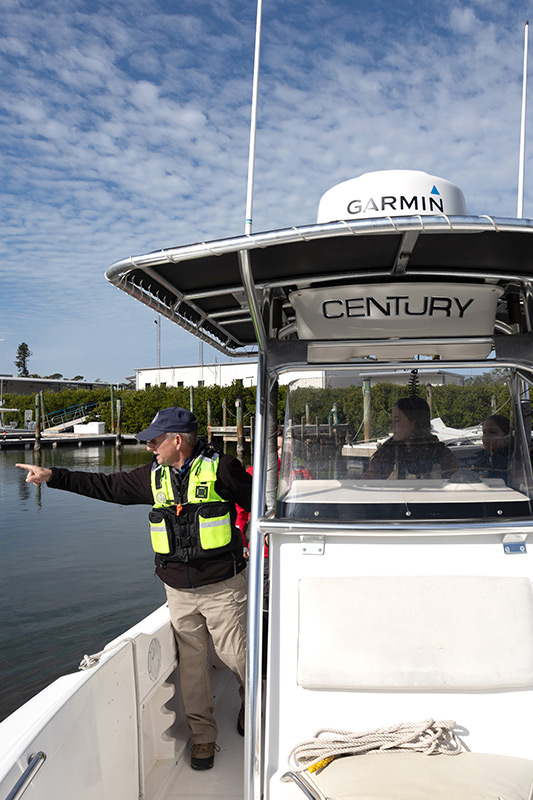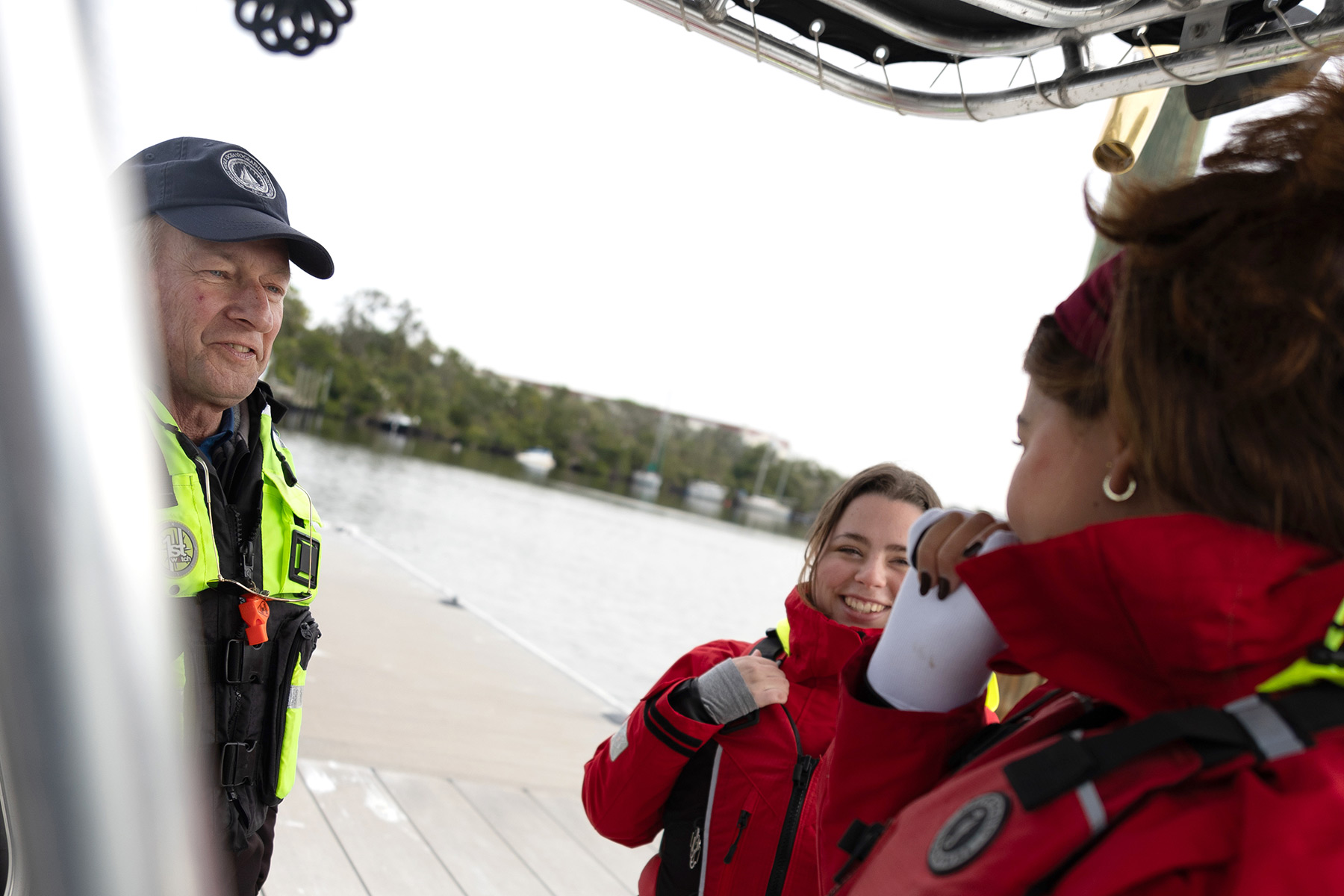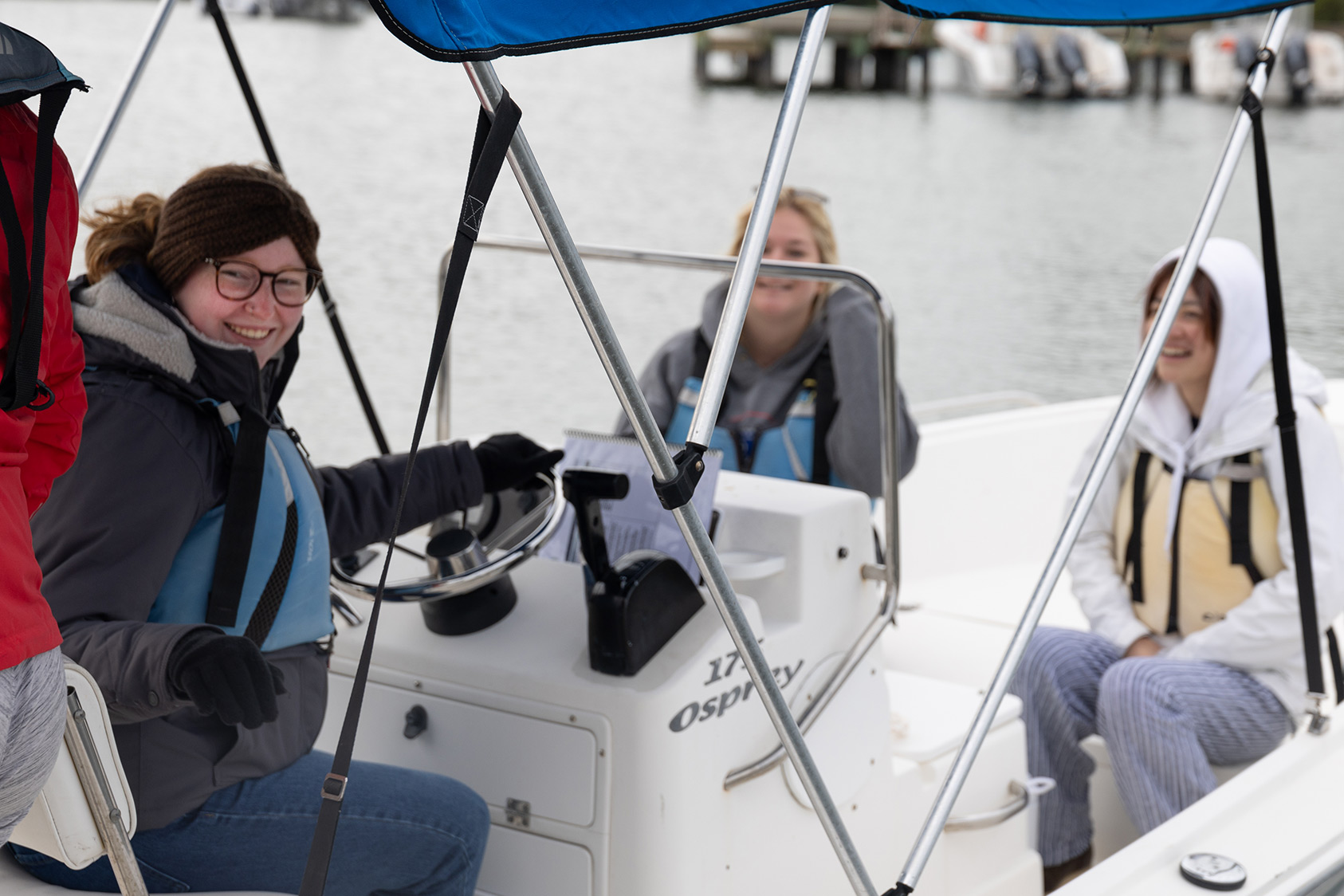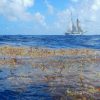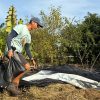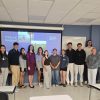On a chilly Wednesday morning recently, 15 Eckerd College students climbed aboard four of the College’s powerboats and, with instructors standing by, took turns practicing simple maneuvers on Frenchman’s Creek, just a few hundred yards off Eckerd’s Waterfront Complex.
Many of the students had never been on a powerboat, let alone something with a 200-horsepower outboard motor churning at the back.
But this was a unique opportunity. On-the-water powerboat training like this is rare in the United States, largely because most states don’t require boaters to leave the dock to be licensed. It’s not like getting a driver’s license. Boaters in Florida, for instance, are required to complete an approved boating education course, but it’s usually done online or in a classroom.
The Frenchman’s Creek exercise was part of Science of Seafaring, an Eckerd College Winter Term course taught by Laura Wetzel, Ph.D., professor of marine science and geosciences, along with Ryan Dilkey ’98, associate director of the Waterfront Program and director of the Eckerd College Search and Rescue Team. The course, which is offered every other January Winter Term, merges the history of ocean exploration and modern oceanography with practical seafaring techniques and powerboat operations.
Before students boarded the boats, they spent an hour with Eric Lundin ’84, a recipient of the College’s Renee Register ’83 Outstanding Alumni Award. Lundin recently retired as a captain with the Connecticut Environmental Conservation Police after 26 years of service.
A lifelong Connecticut resident, he learned his primary boating and team-building skills as an Eckerd College Search and Rescue crew member and boat captain.
He has spent his career on the water and is a U.S. Coast Guard–licensed captain, boating instructor (on-water and in-classroom), boating safety consultant, and boating accident/incident investigator.
“Sharing what I know with the next generation and promoting boating safety is my way of giving back to my alma mater and showing what can be done,” explains Lundin, who volunteered to spend a week serving as one of the powerboat instructors. “Operating a boat is not as easy as it looks. Hopefully the students gain a healthy awareness of safety on the water. I’ve seen so many times when I was investigating a boating accident how important that is.
“And they’re getting on-the-water powerboat training that’s not required anywhere around the country,” he adds. “Most states require a basic eight-hour class that you can do online. But that’s usually just boating knowledge, like how many life jackets and fire extinguishers you need. As far as on-the-water operation, testing is not mandated. So Eckerd students have a leg up on others when they look for internships or jobs that involve operating a boat.
“It’s a joy to see boating concepts put to use,” he says. “To see students steer a boat back to the dock successfully and safely … you can see the lightbulb come on.”
Students also benefited from meeting with Eckerd graduate Courtney Cox ’14, a marine naturalist who operated large vessels for the Pacific Whale Foundation in Hawaii and now works for the Florida Fish and Wildlife Conservation Commission as a watercraft safety officer.
Wetzel says her own goal is to make the world and the students safer. “And on the academic side, I’m having the students read Captain Cook’s journal and Charles Darwin’s Voyage of the Beagle. They are also learning about the sinking of the Titanic, Ernest Shackleton’s remarkable journey on the Endurance, and the development of science at sea.” At the end of the course, students choose a ship, such as Jacques Cousteau’s Calypso or a modern research vessel, and then give a presentation to the class describing the scientific discoveries made from the ship. The course fulfills the College’s Natural Sciences Academic Area requirement.
“I first offered this course in 2018, and now we do it every two years,” Wetzel adds. “When I get asked what’s my favorite class to teach, I often say this one. It’s so much fun to have a Winter Term course on campus learning how to drive boats and about the history of seafaring, and having a chance to bring together alumni, students and Waterfront staff.”
Olivia Regan, senior environmental studies student from Hamden, Connecticut, has been around boats since she was a child; she got a boating license from her home state when she was in high school. “I wanted to expand my knowledge about boating in general, and this course offers a unique experience you wouldn’t get anywhere else,” she says. “I was never taught how to dock a boat, and these last three days have been interesting. It’s not super difficult, but not something you could do on your first try.”
Olivia plans to enter the field of coastal management, where she’ll likely be working on a research vessel. “Using the experience and knowledge I’ve gained from this course could really help me later on,” she says. “But it’s not just about safe boating. It’s also about shipwrecks, explorers, tides, Captain Cook. I love this class.”
International business student Tanner Vogel says she found the course because she was looking for a class to fulfill her Natural Sciences requirement and thought it looked interesting. “I have lots of previous boating experience, so I thought that this would be a great class to learn more about the history of voyages and the science behind the water,” the junior from Roanoke, Virginia, explains.
“Going forward, this class will help me understand the sea life, geology and oceanography around me, as well as bring great boating and safety habits on future boating endeavors.”
A January tradition at Eckerd that offers study abroad and classes on campus, this year’s Winter Term extended from Jan. 3 to Jan. 24. If there is an ideal place to think outside, this is it. There are no prerequisites, students can focus on a single topic, and they also can fulfill an academic-area requirement.
“I originally didn’t get in Dr. Wetzel’s class because it was full,” says Christina Edmondson, a sophomore psychology and animal studies student from Westminster, Massachusetts. So she emailed Wetzel and asked to be put on the waiting list. “Dr. Wetzel emailed a day or two later that a spot was open, and I registered that moment. And I called my parents immediately.
“The biggest reason I took the class was that it was out of my comfort zone,” Christina explains. “I grew up on a lake and we had small watercraft, but I never learned how to drive a powerboat. I was nervous going in. But I wanted to be comfortable on the water and push myself a little. And the academic side of the class is really interesting.
“This course will definitely help me going forward,” she adds. “And it’s been so much fun.”

